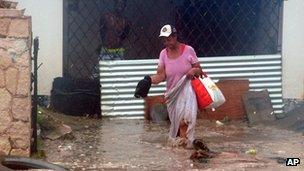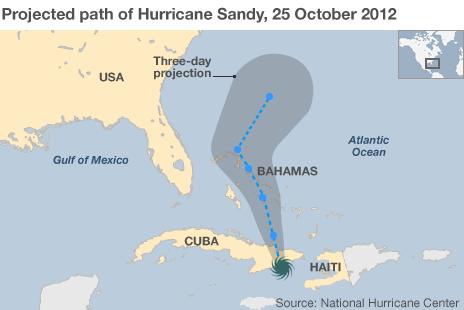Sandy hits Cuba as category two hurricane
- Published
The BBC's Will Grant reports from Havana
Sandy has reached south-east Cuba and strengthened into a strong category two hurricane.
The hurricane was carrying maximum sustained winds of 175km/h (110mph) as it hit land just west of Santiago de Cuba, said the US-based National Hurricane Center (NHC)., external
On Wednesday, one man was killed as Sandy swept over Jamaica.
A hurricane watch is in place in the Bahamas, and Florida has been placed on tropical storm watch.
The NHC said wind gusts of up to to 183km/h had been reported in Santiago de Cuba.
It warned the hurricane was bringing heavy rain which could "produce life-threatening flash floods and mudslides, especially in areas of mountainous terrain".
Forecasters said up to 300mm (11 inches) of rain was expected to fall in some areas of eastern Cuba, Haiti and the Dominican Republic. Some mountainous areas of the Caribbean could see up to 500mm.

Hurricane Sandy has already brought flooding to parts of Jamaica
In Cuba, thousands of residents and tourists have been moved from vulnerable areas under the country's well-rehearsed hurricane evacuation procedures.
"We cannot put a single human life in danger. We must evacuate people in areas we know are likely to be flooded, without losing time," civil defence official Lazaro Esposito told local media.
At 02:00 local time (06:00 GMT) Sandy was about 15km north-northwest of Santiago de Cuba, moving to the north-northeast at about 24km/h.
It is expected to weaken overnight as it moves across Cuba and over the central Bahamas into Friday, but it is thought likely to remain a hurricane.
Prisoners moved
In Santiago, some hotels were setting up generators to provide emergency power.
"We're well prepared for the storm," Mayte Cuesta, an employee of the Hotel Melia Santiago, told the Associated Press news agency.
"It will affect us, but we don't think there is any danger."
But 62-year-old Emiliano Lopez, further west in Manzanillo, said he did not know whether his house would be able to withstand the force of the hurricane.
Strong winds and rain have been battering the US naval base and detention facility at Guantanamo Bay.
Hurricane Sandy, which formed in the Caribbean Sea on Monday, strengthens as it heads towards Bahamas. Sarah Keith-Lucas has more.
A Reuters correspondent at the base said electricity supplies were out and workers confined to their quarters. Some prisoners had been moved to safer accommodation, she said.
In Jamaica, more than 1,000 people sought refuge in shelters, with residents reporting widespread power outages, flooded streets and damages to buildings.
The authorities said one person, an elderly man, died when a boulder fell on a house.
A 48-hour curfew has been imposed in all major towns to deter the looting that has accompanied previous storms.
The country's sole energy provider, the Jamaica Public Service Company, said earlier that 70% of its customers were without electricity.
But officials have announced that Norman Manley International Airport in the capital, Kingston, and Sangster International Airport in Montego Bay will both reopen on Thursday morning, the Gleaner newspaper reports.

- Published25 October 2012
- Published25 October 2012